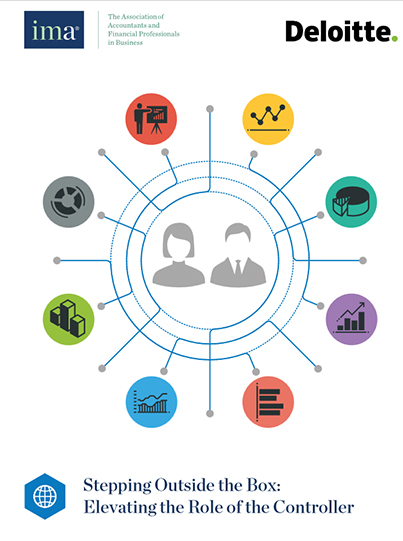
Introduction
Controllers who venture outside the box of the traditional controllership roles are often able to unlock value that their company demands. Finding the courage and time to step out of this box is a battle that many controllers struggle to prioritize over completing day-to-day tasks. To better understand this conflict, IMA® (Institute of Management Accountants) and Deloitte examined the factors impacting how controllers are currently spending their time as opposed to where they should be or would like to spend their time.1Our survey results suggest that controllers in the United States spend nearly 70% of their time performing traditional tasks, such as closing the books or ensuring compliance with accounting standards. As a result, they lack the time to participate in decisions involving organizational strategy. For example, they may be asked to quantify quarterly spend on head count, but they may not be involved in the executive meetings where decisions are made related to organizational restructuring initiatives. Competing demands on time hinder the ability of controllers to focus on building the skills and tools needed to free capacity and enable them to meet the increasing expectations of their role. As a result, controllers are often trapped in a box of traditional tasks that anchors them to a less valued brand and prevents them from stepping out to deliver greater value.A controller who was new to the role found herself so engulfed in meeting the traditional requirements that she was unable to be concerned about more strategic issues, including how to influence executive decision making. When the CFO unexpectedly resigned, she was asked to step up and take over the CFO role without proper preparation. Opportunities fail to appear to some, and others can’t pursue them even when they are available.Corporate controllers often play four diverse and challenging roles within the organization. These roles are (1) a steward, managing risk and preserving assets, (2) an operator, running an efficient and effective finance operation, (3) a strategist, influencing the future direction of the company, and (4) a catalyst, helping to drive execution. To prepare the report that follows, IMA and Deloitte surveyed nearly 800 (majority U.S.) financial professionals in the controllership function to learn how they are navigating the challenges of their roles, what skills they have that they feel need to evolve, and how they continue to add value to their companies. This report provides information on factors that can help professionals in the controllership function deliver more value and evolve with their organization.